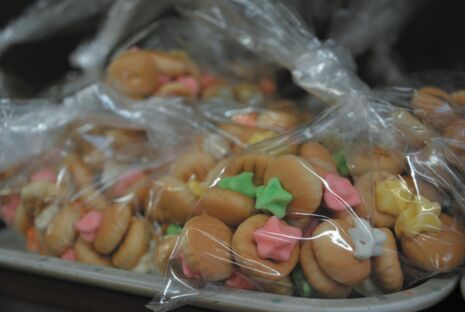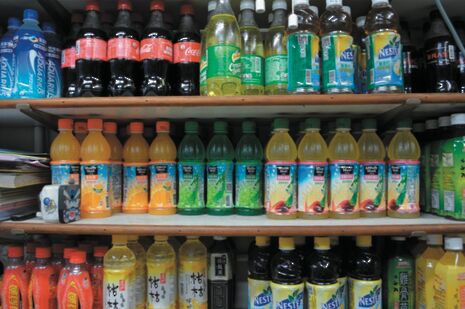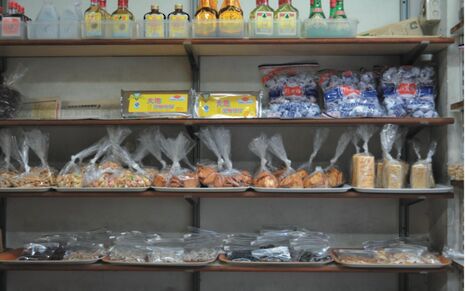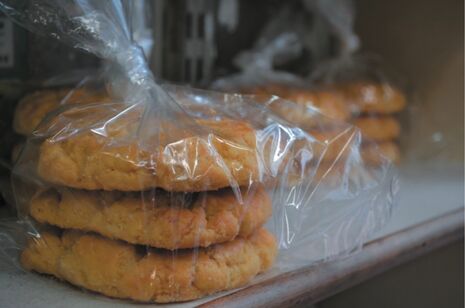The snacks our family’s three generations grew up on
Sheren Mao takes a nostalgic visit to Mr. Chu’s traditional convenience store

Mr. Chu’s store will forever hold a special place in my heart; since a young age, my parents have always brought me here on the weekends, as I find myself standing timelessly in front of the shop, drooling over the array of snacks while carefully making my pick for which goodies I wanted to have this time.
What makes Mr. Chu’s traditional convenience store so distinct is very simple: nostalgia. Amidst the rapid gentrification in the surrounding neighbourhood, this store is one of the final surviving traditional convenience shops in business within the area, and Mr. Chu is currently its third generation owner. Something very interesting to note is that one can easily know this store has been operating for many years just from observing its layout: while this building’s ground floor is the shop with a kitchen at the far back where the family prepares their products every morning, the second floor is the home to Mr. Chu and his family. This conjoined setting of shop and home is a very common feature of the late 1900s buildings of Hong Kong.
“Nostalgic snacks and biscuits, preserved fruits, bottled soft drinks… you name it, but our traditional Hong Kong cake delicacies like sesame rolls, red bean pudding, and fresh mango mochi still remain as our best sellers,” Mr. Chu’s wife proudly told me. “Every morning, we wake early to prepare most of these delicacies, which generally require a minimum preparation time of four to five hours. Otherwise, our other products like traditional bottled soft drinks and fruit teas,” as she pointed to the three rows of colourful drinks on the wooden shelves, “are imported. But one thing that has remained unchanged all along is that we have been selling all these products since my grandfather-in-law’s days.”

If I am being completely honest, one would easily miss Mr. Chu’s store as it is hidden in such an inconspicuous location, opposite two major supermarkets. However whenever I walk by, I never fail to see customers, ranging from toddlers to construction workers. It really is a heartwarming sight, and I am sure it is, too, a fulfilling feeling for the Chu’s, in particular in light of the hardships they face when running this business.
“There’s no denying it but there is not much joy to my job. I go through the same routine every and it gets quite boring sometimes. It also becomes tough when there are not enough people to help out or if business does not go well that day,” Mr. Chu explained. “However, what keeps me going is having customers compliment our food and come back for more. In particular, it is extremely touching to see different generations from the same family purchase from us. Their kind words and support give my family and I motivation to continue this business in this competitive society.” A slight smile curved up on his face.

“Yes, making a living is the primary reason why this shop is still open, but my perseverance is also fuelled by my perception of what a privilege it is, to be able to create and share my home’s most authentic food culture with future generations. In the recent years, I am sure you have seen numerous articles on the closing of many traditional convenience stores as rent prices skyrocket; this is definitely a pity as this means many younger people may never be able to savour and relive, even if it is just a little bit of, their parents’ or grandparents’ childhood days.”

Seeing how there seemed to be a continual steady flow of customers at Mr. Chu’s shop, I became more curious about how affected his sales and rent were by recent gentrification projects in the neighbourhood, and the future prospects of the industry.
“On one hand, thankfully, my grandfather bought this location, so we don’t have to worry much about rent prices and being evicted. On the other hand, even though this neighbourhood has had multiple new building projects in the past years, I would not say there has been a massive drop in our business. Yes, more tourists have been spotted around here, but they actually only make up about 0.01% of our consumers; people from the neighbourhood will always remain our main customers.”
“In terms of the industry itself, it is no doubt these traditional convenience stores are in decline, and I would even dare say there is no use relying on the government at all. Commercialisation will do us little help as well. It really is ultimately up to the willpower and perseverance of existing owners to push on. Because the chances of having any successors are very, very slim, this makes me even more determined to last as long as possible in this business. It will most certainly be very regretful to have Hong Kong’s nostalgic delicacies fade away.”
 News / Eight Cambridge researchers awarded €17m in ERC research grants27 December 2025
News / Eight Cambridge researchers awarded €17m in ERC research grants27 December 2025 News / Clare Hall spent over £500k opposing busway 24 December 2025
News / Clare Hall spent over £500k opposing busway 24 December 2025 Comment / League tables do more harm than good26 December 2025
Comment / League tables do more harm than good26 December 2025 Comment / The ‘class’ of Cambridge24 December 2025
Comment / The ‘class’ of Cambridge24 December 2025 News / Caius mourns its tree-mendous loss23 December 2025
News / Caius mourns its tree-mendous loss23 December 2025









